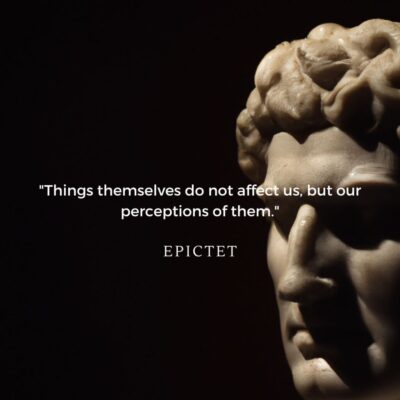Have you ever had such a bad day that you felt like you couldn’t take it anymore? Or maybe you’re facing a difficult situation and feel like you don’t have the resources to continue. In such moments, stoicism can be a powerful ally.
The Stoics believed that a state of emotional balance can be achieved by accepting the things we cannot control and by focusing our actions on the things we can control. Thus, stoicism can help us keep calm and control our reactions in difficult situations, see more clearly, and focus on what really matters.
In this article, we will explore the principles of Stoicism and give you concrete examples of how we can apply this philosophy to our everyday lives.
Whether you’re facing personal or professional challenges, stoicism can be a valuable way to improve your emotional resilience and build a better life.
Table of Contents
What is stoicism?
Stoic philosophy originated in ancient Greece and later spread to Rome and other parts of the world. Stoicism focuses on developing a rational and practical attitude towards life that helps us face challenges and improve our quality of life.
It emphasizes the development of personal virtues and our attitude toward external events.
We can think about the fact that in our life there are things that we can control and things that we can control.
What we can control:
- own thoughts
- our attitude or reaction to something external
What we cannot control:
- the weather
- people around
- the economy
- legislative changes
- and any external event beyond our control
In Stoicism, it is believed that suffering and pain are not bad but are only subjective interpretations of external events.
Instead of avoiding suppressing negative emotions, Stoics encourage an attitude of acceptance and control over one’s reactions and actions.
We can imagine those Buddhist monks that we still read about in books or see in movies or in Ted Talks. They always seem to have a zen attitude toward life and are in total control of their emotions.

Why do we need stoicism?
I believe we need to adopt stoicism in our lives because in general life is full of challenges and events that affect us emotionally and mentally.
And most of the time, negative emotions (even if they are very rare) have a stronger effect on us. It has been scientifically proven that negative emotions cause various diseases over time.
Fortunately, we can avoid all these problems as much as possible if we manage to control our emotions. And we can do this by adopting the teachings of the Stoics:
- we learn to face challenges
- we learn to develop a positive attitude
- we learn to detach ourselves from difficult moments and look at the
- world from an objective perspective (as if we detach ourselves from our body and look at ourselves from 5 meters away)
Stoicism also helps us develop useful skills such as rational decision-making, empathic communication, and developing emotional resilience.
We know very well that due to pressure or emotions that dominate us there is a chance to make mistakes when we are in an important exam or in front of an audience.

How does stoicism help us?
Stoicism can be helpful in a variety of ways, from improving personal well-being and interpersonal relationships to dealing with professional challenges and difficult life situations.
Here are some ways Stoicism can help us:
- Improving emotional resilience – Stoicism teaches us to control our emotions and accept what we cannot change. This skill can help develop a stronger mental state and reduce stress.
- Developing a more positive outlook – Stoicism teaches us to find value in difficult situations and focus on the positive aspects of life. This skill can help increase happiness and life satisfaction.
- Increased Decision Making – Stoicism teaches us to make decisions based on reason and what is best for us, instead of being driven by emotions or impulses.
- Improving interpersonal relationships – Stoicism teaches us to be empathetic and treat people with respect, which can help develop better relationships with those around us.
- Addressing Professional Challenges – Stoicism can help us focus on our goals and overcome professional obstacles. This skill can help improve our careers and increase our professional success.

How do you learn to be stoic?
First of all, you need to be aware of the principles of Stoicism, and then start applying them in your everyday life:
Accept what you cannot control
All you have to do is accept some things. For example, when you are in traffic and there is a lot of commotion around you, it is very likely that you will start to get angry. Unfortunately, you know very well that there is nothing you can do but be patient because you cannot control the traffic.
What you can control, however, is your mood. And to help you even better, listen to music that makes you feel good, listen to a podcast, talk to a loved one, or meditate.
Find value in difficult situations
You know the saying: “you learn from mistakes”. Well, everyone makes mistakes. It’s normal to feel bad when you’re wrong because that’s when the ego comes into play. However, remember that this mistake is temporary and no matter how insignificant or catastrophic it is, you cannot turn back time.
But what you can do from now on is take this experience as a lesson and be careful what you do in the future.
When I make a mistake, I accept the fact that I made a mistake (i.e. I put my ego aside), and then I try to figure out what I need to do better to win.
Control your emotions
In conflict situations, anger is likely to dominate us. However, we must learn to control it. If you are an impulsive person, it will be difficult, that’s for sure. But in delicate situations, it would be best to quickly take a short break.
For example, if you are in a heated discussion and you feel yourself starting to lose control and become tenser, take a quick break, go to the bathroom, wash your face, and regain control.
Make decisions based on reason
You have to think rationally not emotionally. Unfortunately, this is not exactly easy because we humans in general are emotional beings. Although we appeal to reason as much as possible, indirectly we are very emotionally influenced by circumstances.
Control comes the moment you put things down on paper. What you can do is critically and rationally analyze the good parts and the bad parts and make a favorable decision for yourself. Sometimes you have to take risks, that’s right. But reason can help you in critical moments.

Watch the full Masterclass: The complete strategy to scale your coaching, consulting or online education business to 6-7 figures/year in 4 simple steps.
Communicate empathetically
Stoicism teaches us to be understanding and treat people with respect. You never know what a person has been through.
This is where people often tend to resort to racism, stereotypes or assumptions about other people.
In the year 2023, I learned a lot about what these stereotypes and assumptions mean.
In short, don’t judge a man by his clothes. I have seen numerous cases where very intelligent and wealthy people dressed very classically without anything out of the ordinary. No expensive brands in sight.
I also met intelligent and wealthy people who dressed very extravagantly. You would tend to think at first glance that they seem like arrogant or self-confident people, but when you get to know them and talk to them, you realize that they can be your role models (and I don’t necessarily mean in clothing).
So the lesson here is to be careful not to make assumptions or judge people without understanding their context. Maybe they feel bad, maybe they have family problems, maybe they had a miserable life and now they have come across something extraordinary.

Quotes about Stoicism
- “We have no control over the outside. We must learn to control our thoughts.” – Epictetus
- “Be the master of your thoughts and you will no longer have to fear any adversary.” – Marcus Aurelius
- “It is not the things themselves that affect us, but our perceptions of them.” – Epictetus
- “Don’t let what you can’t do get in the way of what you can do.” – John Wooden
- “There is no evil that cannot be turned into another evil, except stupidity.” – Seneca
- “It’s not that we have too little time, it’s that we waste too much. Life is long if you know how to use it.” – Seneca
- “There is nothing good or bad, but thinking makes it so.” – Marcus Aurelius
- “Our thoughts become our own masters when we allow them to be. But if we dominate them, they become powerful servants.” – Epictetus
- “Don’t wait for life to be fair. You have to be fair in how you live your life.” – Marcus Aurelius
- “No problem can be solved by the same mind that created it.” – Albert Einstein
- “It’s not that life is too short, it’s that people waste their lives.” – Seneca
- “There’s nothing worse than feeling out of control. There’s nothing better than feeling in control.” – Seneca
- “It is not death and suffering that are terrible, but the fear of them.” – Epictetus
- “We don’t have to do anything but live our lives the way we want, go about our activities with dignity, put aside all worries, be wise and realize that this is all we have to do.” – Epictetus
- “Nothing is so great that a determined mind cannot be defeated, and nothing is so small that it does not deserve attention.” – Marcus Aurelius
- “We do not seek to have what we want, but to want what we have.” – Epictetus
- “We should not compare ourselves to others, but to ourselves. We should measure success by how we have evolved and grown.” – Seneca

Newsletter
Join the 1000+ entrepreneurs, experts, consultants and coaches for free who want to scale their online business to 6-7 figures/year and grow their personal brand.
You will receive 1 email from me every weekend, with tested and validated tips and strategies.





